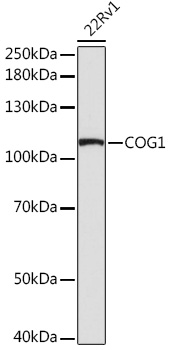Cell Biology Antibodies 13
Anti-COG1 Antibody (CAB17594)
- SKU:
- CAB17594
- Product Type:
- Antibody
- Reactivity:
- Human
- Reactivity:
- Mouse
- Reactivity:
- Rat
- Host Species:
- Rabbit
- Isotype:
- IgG
- Antibody Type:
- Polyclonal Antibody
- Research Area:
- Cell Biology
Description
| Antibody Name: | Anti-COG1 Antibody |
| Antibody SKU: | CAB17594 |
| Antibody Size: | 20uL, 50uL, 100uL |
| Application: | WB IHC |
| Reactivity: | Human, Mouse, Rat |
| Host Species: | Rabbit |
| Immunogen: | A synthetic peptide of Human COG1. |
| Application: | WB IHC |
| Recommended Dilution: | WB 1:500 - 1:2000 IHC 1:50 - 1:200 |
| Reactivity: | Human, Mouse, Rat |
| Positive Samples: | 22Rv1 |
| Immunogen: | A synthetic peptide of Human COG1. |
| Purification Method: | Affinity purification |
| Storage Buffer: | Store at -20°C. Avoid freeze / thaw cycles. Buffer: PBS with 0.02% sodium azide, 50% glycerol, pH7.3. |
| Isotype: | IgG |
| Sequence: | Email for sequence |
| Gene ID: | 9382 |
| Uniprot: | Q8WTW3 |
| Cellular Location: | |
| Calculated MW: | |
| Observed MW: | 109kDa |
| Synonyms: | CDG2G, LDLB, COG1 |
| Background: | The protein encoded by this gene is one of eight proteins (Cog1-8) which form a Golgi-localized complex (COG) required for normal Golgi morphology and function. It is thought that this protein is required for steps in the normal medial and trans Golgi-associated processing of glycoconjugates and plays a role in the organization of the Golgi-localized complex. [provided by RefSeq, Jul 2008] |
| UniProt Protein Function: | COG1: Required for normal Golgi function. Defects in COG1 are the cause of congenital disorder of glycosylation type 2G (CDG2G); also known as CDG-II caused by COG1 deficiency. CDGs are a family of severe inherited diseases caused by a defect in glycoprotein biosynthesis. They are characterized by under-glycosylated serum glycoproteins. These multisystem disorders present with a wide variety of clinical features, such as disorders of the nervous system development, psychomotor retardation, dysmorphic features, hypotonia, coagulation disorders and immunodeficiency. The broad spectrum of features reflects the critical role of N-glycoproteins during embryonic development, differentiation, and maintenance of cell functions. Clinical features of CDG2G include failure to thrive, generalized hypotonia, growth retardation and mild psychomotor retardation. CDG2G is biochemically characterized by a defect in O-glycosylation as well as N-glycosylation. Belongs to the COG1 family. |
| UniProt Protein Details: | Protein type:Vesicle Chromosomal Location of Human Ortholog: 17q25.1 Cellular Component: Golgi apparatus; Golgi membrane; Golgi transport complex; trans-Golgi network membrane Molecular Function:protein binding Biological Process: ER to Golgi vesicle-mediated transport; Golgi organization and biogenesis; retrograde transport, vesicle recycling within Golgi Disease: Congenital Disorder Of Glycosylation, Type Iig |
| NCBI Summary: | The protein encoded by this gene is one of eight proteins (Cog1-8) which form a Golgi-localized complex (COG) required for normal Golgi morphology and function. It is thought that this protein is required for steps in the normal medial and trans Golgi-associated processing of glycoconjugates and plays a role in the organization of the Golgi-localized complex. [provided by RefSeq, Jul 2008] |
| UniProt Code: | Q8WTW3 |
| NCBI GenInfo Identifier: | 22653695 |
| NCBI Gene ID: | 9382 |
| NCBI Accession: | Q8WTW3.1 |
| UniProt Secondary Accession: | Q8WTW3,Q9NPV9, Q9P2G6, |
| UniProt Related Accession: | Q8WTW3 |
| Molecular Weight: | 108,978 Da |
| NCBI Full Name: | Conserved oligomeric Golgi complex subunit 1 |
| NCBI Synonym Full Names: | component of oligomeric golgi complex 1 |
| NCBI Official Symbol: | COG1 |
| NCBI Official Synonym Symbols: | LDLB; CDG2G |
| NCBI Protein Information: | conserved oligomeric Golgi complex subunit 1 |
| UniProt Protein Name: | Conserved oligomeric Golgi complex subunit 1 |
| UniProt Synonym Protein Names: | Component of oligomeric Golgi complex 1 |
| Protein Family: | Conserved oligomeric Golgi complex |
| UniProt Gene Name: | COG1 |
| UniProt Entry Name: | COG1_HUMAN |







